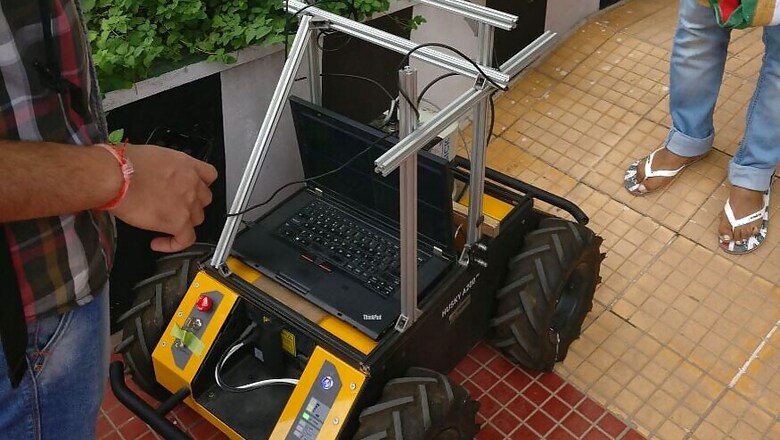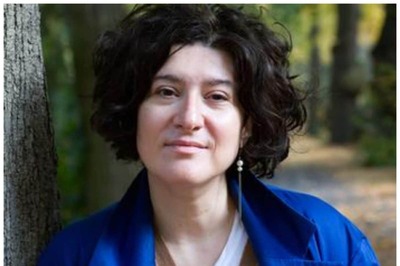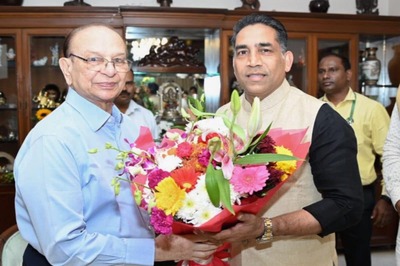
views
The leafy campus of the International Institute of Information Technology (IIIT), tucked away on the outskirts of Hyderabad, is deceptive. Students mill around carrying computer science literature and backpacks and faculty members walk towards classrooms. Suddenly, a self-driving robot rounds the corner and trundles towards the robotics department. Sensors on the front, its ‘eyes’, scan the road ahead for obstacles while a mounted laptop, its ‘brain’, contains code that guides it.
The self-driving bot, nicknamed ‘Huskie’, is just one of several innovative tech experiments being carried out here. The institute was set up 19 years ago and was the first IIIT. The model was later followed by Ministry of Human Resources Development to promote IT education in the country.
The IIIT-H is an important centre for the innovation of new technologies like artificial intelligence, robotics, machine translation in Indian languages, and algorithms. In fact, IIIT has two incubators on campus where start-ups are developing technologies which may put Indian IT ahead of the curve and create jobs.
The start-up scene is still nascent in India. However, Hyderabad has one of the best ecosystems for start-ups in the country. The city of Nizams boasts of at least 14 business incubators, which handhold and mentor early stage start-ups till their business model becomes self-sustaining and revenue generating.
The Centre for Innovation and Entrepreneurship (CIE) is IIIT’s incubator which is trying to mentor ‘deep tech’ start-ups in the domains of computer vision, natural languages/speech recognition, artificial intelligence, virtual reality and gaming. Apart from this, the T-Hub, a business incubator promoted by the Telangana government, is also located on campus. Together, the two incubators host around 200 start-ups.
Indian IT’s traditional model of body shopping and price arbitrage is under pressure like never before. New technologies, like the ones underlined above, are disrupting the business model. IT firms are cutting costs in order to stay competitive, resulting in firings.
However, start-ups are the flip side of this story. If layoffs and firings are the unfortunate aspect of a cutthroat business environment, start-ups represent a business opportunity to create new technology. The start-up scene is still nascent in India. Ramesh Loganathan, with 2 decades of experience in the IT industry and who now is a professor at IIIT-H mentoring start-ups, estimates that the city has around 1000-1500 start-ups employing about 30,000 to 40,000 people. The Indian IT industry by contrast employs around 40 lakh people.
“Our education system kills innovation and creativity, graduates just want to get into a regular job with a big IT firm and be content,” Loganathan told News18. “Start-ups, on the other hand, are an opportunity for Indian IT to leapfrog the technology curve and create jobs and employment.”
Other incubators in the city include Srujana, the L.V. Prasad Eye Institute’s research centre, which focuses on tech innovations in the ophthalmology space; a Life Sciences incubator being funded by some of the top companies working in that space; a general incubator, health incubator and an electronics incubator at the Indian Institute of Technology-Hyderabad campus.
Rahul Bhatial, a student at IIT, is the co-founder of Dreamview, a start-up which is being incubated at IIIT’s CIE. Rahul and Rajat, the other co-founder, are developing a high-end VR camera, which can be used on drones and for border security. The start-up is not revenue generating at present, but the founders hope to raise a million dollars by the end of the year. The clients they are talking to include an Israeli drone company.
Or take Flatpebble, a start-up founded by 38-year old Venkatesan Seshadri and friends. Venky, as he is called, worked for Microsoft and Infosys for more than a decade before the start-up bug bit him. “Microsoft was paying us a lot of money and we were getting comfortable. By the age of 40 you lose all your drive. The option was either move to the US and stick to a corporate routine or take a chance in India,” Venky told News18.
Flatpebble provides professional wedding photography and allied services. The product is a mobile app that acts as an aggregator. Around 4000 photographers are already registered on what Venky calls the ‘Uber of wedding photography’. The start-up has already generated half a million dollars (Rs 3.2 crore) worth of transactions and employs 20 people.
P.J. Narayanan, the director of IIIT-H, has a vision about the role of start-ups and technology. “Technology should be used to serve the bottom of the pyramid,” he said. Although he felt that higher end jobs were opening up and Indian start-ups were well positioned to exploit the opportunity, a lot could be done to develop technology to serve Indian needs.
For instance, machine translation in Indian languages is an area where technology could fill a vast gap. “If you speak English there are enough tools out there, but the technology to translate to and from Indian languages is still lacking. A person who only speaks Tamil or Telugu or any other Indian language could be served by start-ups that build technology to serve their needs and imagine what an opportunity that would be,” Narayanan said.
Narayanan cited an example where the Telangana government asked a start-up to create an app that warned people to stay indoors just before a heat wave.




















Comments
0 comment